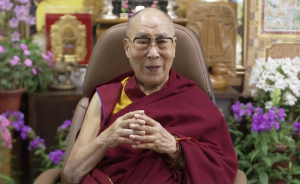https://www.bbc.com/news/world-asia-china-63410339
Footage has emerged showing what appear to be rare large-scale protests against strict Covid-19 measures in the Tibetan regional capital, Lhasa.
Multiple videos on social media show hundreds demonstrating and clashing with police. They are said to be mostly ethnic Han Chinese migrant workers.
The city has been under lockdown for nearly three months as it battles a wave of infections.
Tibet is one of the most tightly guarded regions in China.
The protests are said to have taken place on Wednesday afternoon and stretched on till the night.
One video shows hundreds of people gathered on the streets, with officials blocking them at one end. A message calling for calm can be heard on a loudspeaker, with an official asking for people to “please be understanding and to go back”.
Another video shows scores of people on the streets at night, and a man can be heard commenting on the scene.
“[They] have been locked up for too long. And a lot of people in this community are people who have just come to work and earn money. If they could get that in mainland China, they wouldn’t have come here,” he says in Mandarin.
Yet another video showed people marching in the streets with the caption “We just want to go home”.
The BBC was unable to independently verify the videos, which have been removed on Chinese social media but reposted on Twitter.
Tibetan sources have told news outlet Radio Free Asia (RFA) that protesters warned they would “set off a fire” if restrictions were not lifted – though it is not clear what this meant.
Another source said there were fears that scuffles between civilians and police officers could turn violent.
One Lhasa resident told the BBC that she didn’t see the protests as she was still under lockdown, but had seen numerous videos circulating in chat groups.
“People are locked at home everyday and life is so hard. Prices in Lhasa now are so high and landlords are chasing people for rent. The workers also aren’t allowed to go back to their hometown. They have no other way out,” said the resident, who only wanted to be identified by her surname, Han.
“People were asking for a solution – if they might be able to leave.”
Ms Han said she had been in lockdown for almost 80 days, adding that people were allowed to roam inside the compound for several hours a day – but couldn’t go beyond that.
“Who knows what the real number [of Covid cases] are now? Every day we can hear that people need oxygen. The government can report whatever numbers they want.”
The BBC has seen multiple posts on Douyin, China’s version of TikTok, from people who said they were trapped in Lhasa as a result of Covid measures.
“Today is the 77th day of the lockdown in Lhasa. I don’t know how long it will continue to be like this. I [cant find] hope. Can you understand… how hard it is for migrant workers?” the post said.
“We haven’t had any income for three months – but expenses have not been reduced even by a penny. My friends in Lhasa – how long can you go on like this?” said another post.
There has been no official comment or state media reports on the protests, although local officials on Thursday said eight new Covid cases had been reported in Lhasa.
On Chinese social media platforms, all footage of the incident has been scrubbed, although checks on Douyin found that many were searching for terms related to the protest, such as “what happened in Lhasa tonight”.
Lhasa has been in lockdown since late August. Rights groups have claimed that several Tibetans have killed themselves since it began.
China’s zero-Covid policy has saved lives, but also exacted a punishing toll on the Chinese people and economy, with increasing public fatigue over lockdowns and travel restrictions.
Wednesday’s protest is said to be the biggest the city has seen since an uprising in 2008, which saw at least 19 people killed.
Chinese security forces were accused of using both brutal beatings and lethal force against protesters back then. In the wake of that incident, Tibet was closed to foreigners and tens of thousands of Chinese soldiers were sent to the region.
Tibet is governed as an autonomous region of China, and Beijing says it has developed considerably under its rule.
But rights groups say China continues to violate human rights, accusing Beijing of political and religious repression. Beijing denies any abuses.






